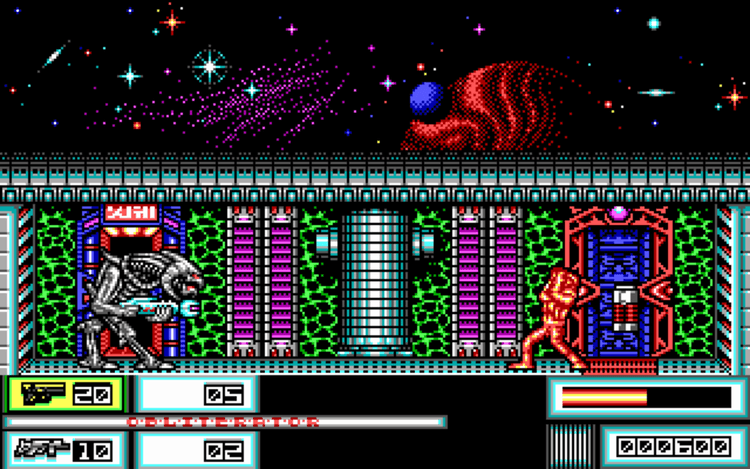
Obliterator is a moody sci-fi action-adventure game published by Psygnosis, set aboard a labyrinthine alien battleship. You play a highly trained operative infiltrating hostile corridors, balancing fast gunplay with careful exploration and smart item use. Fans of cinematic platform shooters like Flashback and Blackthorne will recognize the deliberate pacing, environmental storytelling, and tense combat loops. The game’s atmospheric art direction, eerie sound cues, and interconnected rooms reward observation and tactical movement. Whether you want to play casually or master every route, this classic remains engaging to revisit online and offline, offering timeless arcade firepower wrapped in an exploration-driven design.
Obliterator drops you into the boots of a lone commando boarding a sprawling alien craft. Published by Psygnosis, the game blends side-scrolling action with thoughtful navigation and light puzzle solving, creating an experience that feels both arcade-sharp and adventure-rich. Instead of pushing you down a straight corridor, it presents a maze of chambers, airlocks, and terminals. Every room hints at danger or opportunity: a flicker of machinery, a humming console, a suspiciously quiet access tunnel. The design encourages you to think like a saboteur who must disable systems, gather useful items, and carve a path to extraction while under constant pressure.
Psygnosis’ signature presentation is all over the screen. Menacing alien silhouettes, sleek interfaces, and restrained color palettes build an otherworldly mood. The result is a sci-fi infiltration fantasy where every encounter feels earned. Obliterator refuses to be only about reflexes; it asks you to read the environment, manage resources, and choose engagements wisely. It’s an approach that keeps tension high from the first corridor to the final escape.
Combat is crisp and readable. Enemies telegraph their presence through sound and motion, giving you just enough time to adjust stance, fire a volley, or duck back to safety. The operative moves with weight; shots feel decisive rather than spray-and-pray. As you map out sections of the ship, you’ll discover terminals that open doors, platforms that shift layout, and devices that need specific items to function. This item interaction is key: ammo, access tools, and mission-critical gear reward players who explore thoroughly and remember where locked pathways were encountered.
Obliterator’s pacing is a deliberate alternation between scan, act, and move. You’ll scan for hazards or secrets, act to clear threats or unlock progress, then move to the next chokepoint. Because many rooms interconnect, routes loop back on themselves in satisfying ways, making each breakthrough feel like you’ve cracked a code. It’s a confident design choice that keeps backtracking brisk and purposeful rather than tedious.
Visual direction favors bold silhouettes and striking machinery over busy detail, which makes danger easier to read and reinforces the alien ship’s unsettling scale. Subtle effects—distant echoes, ambient drones, the snap of a weapon discharge—add to the tension. While the presentation is unmistakably from the classic DOS era, the overall mood hasn’t aged: the ship still feels like a place you shouldn’t be, and the enemies still feel like predators guarding territory.
Movement through the ship tells its own story. A sealed hatch implies a secure area with better gear. A humming reactor corridor suggests larger stakes. Crates, consoles, and strange devices act like breadcrumbs without requiring explicit text, and the minimal UI lets your imagination do the heavy lifting. Obliterator trusts the player to connect dots, and that trust is part of its enduring appeal.
Play Obliterator online to enjoy a quick session or a full run without setup headaches. The game can be played free, directly in a browser, and it works on mobile devices without restrictions. Whether you’re revisiting a favorite or discovering it for the first time, launching into the starship in seconds preserves the game’s pick-up-and-play spirit. The focused controls map cleanly to keyboards and touch, making it easy to blast through patrols, test routes, and refine your infiltration plan from virtually anywhere.
Obliterator shines when you combine caution with decisive action. Peek into a new chamber, note enemy positions, and then commit to a plan—burst through with suppressing fire, or slip past to reach a terminal that shifts the room layout in your favor. Items matter more than they first appear; an innocuous device might open shortcuts miles away in ship-terms. Because combat is lethal in both directions, learning enemy behaviors pays off quickly. Some foes prefer ranged volleys, others pressure you up close. The game is generous to players who adapt: retreat when necessary, re-enter on your terms, and conserve valuable resources for set-piece encounters.
The level structure also supports multiple approaches. You might systematically clear sectors to create safe zones, or fast-track to objective rooms to minimize attrition. Either approach can work, and switching styles mid-run keeps the experience fresh. This flexibility is why Obliterator remains easy to recommend to action fans and explorers alike: it respects different playstyles while keeping the core loop tight.
For many players, the lasting draw is its confidence. Obliterator doesn’t flood you with tutorials or chatter. It presents a hostile environment, a clear mission, and tools enough to succeed if you’re observant. The balance between firepower and curiosity stands out among classic DOS games, and it’s a balance that modern players still appreciate. The game also sits in a lineage with other cinematic action-adventures—think of the deliberate movement and contextual interactions that made titles like Flashback and Blackthorne so memorable—yet it feels distinct thanks to its focused infiltration theme and cohesive starship setting.
Obliterator is perfect for short bursts or focused sessions. You can explore a handful of rooms, learn a patrol pattern, and log a mental map of what to try next time. Conversely, you can commit to a full infiltration, linking discoveries until the ship feels less like a maze and more like territory you own. That elasticity makes it ideal for casual play and mastery runs alike.
Obliterator is a classic that blends sharp action with clever spatial design, all wrapped in the unmistakable atmosphere of Psygnosis. It’s both a blast of arcade energy and a compact study in environmental problem-solving. For controls, most versions map movement to directional keys, with dedicated buttons for firing, interacting with terminals or doors, cycling or using items, and pausing. A few minutes of experimentation will reveal a comfortable setup, and from there the starship is yours to infiltrate.
All used codes are publicly available, and the game belongs to its original authors.
Share game
Share game




Share game